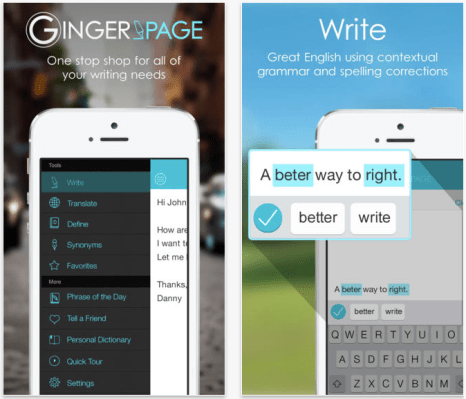Ginger Software, the Tel Aviv-based developer of a personal assistant platform that it sold to Intel for up to $30 million in May this year, is today embarking on the next chapter of its life as an independent startup: the company today is unveiling Ginger Page, an app for Android, iPhone, the Amazon’s devices, PCs and as a web extension, to help people writer better English.
The app is a return, and reinforcing, of the company’s roots: Ginger was originally founded with a focus on language improvement and specifically on written English, with its original service, first out in 2007, applying its natural language technology to build services like proofreading, grammar check, and so on.
Ginger Page is an extension of that, with an all-in-one service that also includes new features such as a synonym checker and “basically anything you need to write great English,” says David Noy, Ginger’s CMO. It’s also the first time that the app has come to the iPhone, having been previously on Android and Windows. Part of that will soon see an update that will come with iOS 8 — taking advantage of new features in the update — that will give users access to a new special Ginger keyboard to use across all apps, a feature it added to Android last year.
Noy says that the sale of some technology and the subsequent transfer of talent (including the company’s founder Yael Karov) to Intel was a practical solution to the fact that the company seemed to be developing two products that were diverging from each other, one focused on language improvement and productivity and the other less on education and more on voice recognition and personal assistant capabilities.
“It was a good way of getting funding to continue the existing project,” he says. Intel is not an investor in Ginger as a result of the acquisition. The company’s backers include Horizons Ventures and Harbor Venture Capital.
The sale was constructed in such a way that both companies are able to use the core engine, which was originally developed at Ginger to help people write in perfect English but was soon found to be just as useful for voice recognition.
Although the app has a new name, Ginger Page, it’s is essentially a new version of the startup’s older app. That means that all of the existing user based — there are 5 million Ginger downloads to date — will be upgraded to the latest version. “But we also hope to use this to penetrate into new market segments,” Noy notes.
Although the app is about helping people write better English, with a focus on those coming to English as a second language, funnily enough the best traction it has seen so far has been in the U.S. This, Noy says, highlights the two kinds of users who Ginger targets.
“In the U.S. we give value to ESL users, but also to those for whom English is their mother tongue. For ESL users, it’s about improving english and avoiding embarrassing mistakes. For native speakers, it’s more of a productivity tool and getting sentences right without much effort.”
The fact that Ginger has a keyboard that a user can use across different apps helps give the service a degree of ubiquity but I suspect the really interesting move to see how Ginger might gain critical mass would be in integrating its tech directly into other apps.
So, for example, those who are not Ginger users but happen to have, for example, Twitter but not Ginger will not write “Your crazy,” when responding to a friend’s zany tweet. “This is an interesting direction for the future but not one that we are actively pursuing,” says Noy. “95% of our effort is about growing our own user base and getting more downloads of our own app.”
Ginger Page is built as a freemium app, where you get a basic, limited service for free with additional features coming on a range of plans that start at $3.90 and go up to $9.40, with the top features including services like personalised tuition based on how you already use the app.
Apart from the fact that there are competitors directly in Ginger’s area (among them, TextMaster, Wordy, Kibin using actual people for the task), there are even bigger fish for Ginger to fry.
Going forward, Noy says that the focus will be on continuing to add more features to the main product. “Our biggest competitors are the platform companies like Apple, Google, and Microsoft,” he says. “Most use the native tools they get from them, and the challenge is to convince those users that the native offerings are very basic, and that Ginger can be a lot more, to convince them that this is even possible.”
